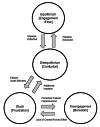Examining the Effects of the Utility Value Intervention on Learners' Emotions and Conceptual Understanding in Online Video-based Learning
- PMID: 37361792
- PMCID: PMC10131495
- DOI: 10.1007/s10639-023-11755-z
Examining the Effects of the Utility Value Intervention on Learners' Emotions and Conceptual Understanding in Online Video-based Learning
Abstract
In asynchronous online video-based learning, learners experience various affective states, which may make them disengaged and negatively influence learning outcomes. This study aimed to examine the effect of the utility value (UV) intervention to help learners emotionally and behaviorally engage in online learning. The UV intervention includes pre-learning writing activity and UV feedback messages to help learners perceive the relevance between the lecture topic and their lives. In particular, we examined the effects of the UV intervention on learners' negative emotions (i.e., confusion, frustration, and boredom) and conceptual understanding. For the experiment, 30 Korean adult learners were randomly assigned to the control, feedback-only, and writing-feedback groups. The control group did not receive any UV intervention strategy. The feedback-only group received UV feedback messages when detected to experience negative emotions during learning. The writing-feedback group performed a pre-learning activity to write about the usefulness of the lecture topic and then received UV feedback messages during learning. We used Ekman's Facial Action Coding System (FACS) to analyze learners' facial expressions associated with negative emotions. Pre-test and post-test were administered to measure conceptual understanding. The findings revealed that the UV feedback messages significantly reduced the occurrence of boredom while the UV writing did not significantly improve conceptual understanding. Overall, this study suggests that additional strategies and longer timing in UV interventions are necessary to intervene in online learners' confusion and frustration. Implications are discussed regarding the design of affective feedback mechanisms in online video-based learning environments.
Keywords: Academic emotion; Affective feedback; Facial expression; Online video-based learning; Utility value intervention.
© The Author(s), under exclusive licence to Springer Science+Business Media, LLC, part of Springer Nature 2023, Springer Nature or its licensor (e.g. a society or other partner) holds exclusive rights to this article under a publishing agreement with the author(s) or other rightsholder(s); author self-archiving of the accepted manuscript version of this article is solely governed by the terms of such publishing agreement and applicable law.
Conflict of interest statement
Conflict of interestThe authors declare that they have no conflict of interest.
Figures









References
-
- Baker RS, D’Mello SK, Rodrigo MMT, Graesser AC. Better to be frustrated than bored: The incidence, persistence, and impact of learners’ cognitive–affective states during interactions with three different computer-based learning environments. International Journal of Human-Computer Studies. 2010;68(4):223–241. doi: 10.1016/j.ijhcs.2009.12.003. - DOI
-
- Buhr EE, Daniels LM, Goegan LD. Cognitive appraisals mediate relationships between two basic psychological needs and emotions in a massive open online course. Computers in Human Behavior. 2019;96:85–94. doi: 10.1016/j.chb.2019.02.009. - DOI
-
- Cabestrero R, Quirós P, Santos OC, Salmeron-Majadas S, Uria-Rivas R, Boticario JG, Ferri FJ. Some insights into the impact of affective information when delivering feedback to students. Behaviour & Information Technology. 2018;37(12):1252–1263. doi: 10.1080/0144929X.2018.1499803. - DOI
-
- Craig SD, D’Mello S, Witherspoon A, Graesser A. Emote aloud during learning with AutoTutor: Applying the Facial Action Coding System to cognitive–affective states during learning. Cognition and Emotion. 2008;22(5):777–788. doi: 10.1080/02699930701516759. - DOI
LinkOut - more resources
Full Text Sources
